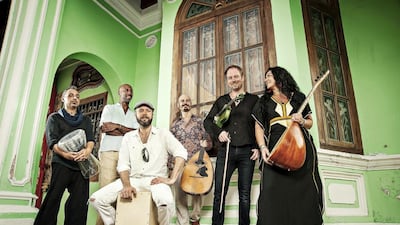This weekend's festivities celebrating the opening of new Abu Dhabi art hub Warehouse 421 wrap up on Saturday with a free performance by Swedish, Arabic-language group Tarabband. The National spoke to their Iraqi-Egyptian frontwoman and founder Nadin Al Khalidi.
How did you end up forming a band playing Arabic music in Sweden?
I grew up in Iraq, where I only played classical music. I went to music school in Baghdad playing violin. Then in 2002 I came to Sweden as a refugee, and started playing covers as a troubadour in pubs and restaurants — Bob Dylan, Joan Baez. I had no interest in Arabic music at all — in my mind I wanted to start my own punk band and play either bass or drums. But I was contacted by a theatre director who wanted me to sing in Arabic. I rejected the idea but I did it anyway. Then I met my collaborator [manhole, guitar and oud player] Gabriel Hermansson and we decided to keep playing together — at first traditional songs from Iraq, Lebanon and Egypt and later original material. As the idea grew, we needed a bigger sound and now we are six people with bass, violin and lots of percussion.
How did you get away from Iraq?
I left just before the war. I escaped from Baghdad to Amman by car, and from Jordan we flew to Europe and ended up in Sweden. I had no idea where I was going; I just wanted to get out and didn’t know how long I’d survive if I stayed. I was with my sister — I lost my mother when I was 12 and later my father; it was only me and my sister left in the middle of everything. I went to the police station in Gothenburg and said: “I’m a refugee.” I stayed one year before moving south to Malmö where I now live. I keep seeing my story repeated, especially now with all the refugees arriving in Europe from Syria and other places. It’s horrible to see. It seems like history keeps repeating itself. I’m very grateful to my country, Sweden, for welcoming me and showing me humanity.
There are many different influences in your original compositions. How would you describe your music?
It’s world music, composed in Sweden, sung in Arabic, and played on instruments from across the Arab world, North Africa and the West, with influences of jazz, Arabic, Latin and folk, and many different styles into one sound. One of the strongest common experiences at all our concerts is that the majority of the audience always identify with something in the music. I see my work as a tool to connect East and West, and create a flow of understanding and tolerance of different cultures.
Where do you find inspiration for your lyrics?
Missing the place where you were born, missing your first love from the place you were born. Many of my lyrics are linked to what is happening right now in the Arab world, and things that are happening in Europe such as the extreme groups that think people like me don’t have a right to live here and should go back where we’re from. That’s why I will keep singing in Arabic — it’s my way of sharing these stories with the world.
Tell us about the name Tarabband.
Early on, I remember at one rehearsal we went to eat falafel. In the shop, the man was listening to Umm Kulthum, this classic Egyptian singer, and he just looked at us and said “tara”. It’s an Arabic expression which means “ecstasy in music”, something special between the band and the listener. That’s what we can hope for in our performances.
• Taraband perform at Warehouse 421 at Mina Zayed on Saturday t 8.30pm. Free entry. For details visit www.warehouse421.ae
rgarratt@thenational.ae

